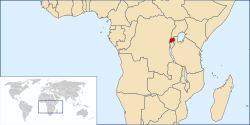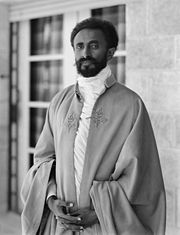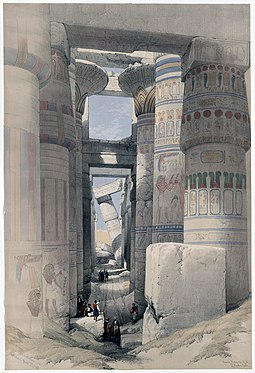Portal:Africa



Africa is the world's second-largest and second-most populous continent after Asia. At about 30.3 million km2 (11.7 million square miles) including adjacent islands, it covers 20% of Earth's land area and 6% of its total surface area. With nearly 1.4 billion people as of 2021, it accounts for about 18% of the world's human population. Africa's population is the youngest among all the continents; the median age in 2012 was 19.7, when the worldwide median age was 30.4. Based on 2024 projections, Africa's population will exceed 3.8 billion people by 2100. Africa is the least wealthy inhabited continent per capita and second-least wealthy by total wealth, ahead of Oceania. Scholars have attributed this to different factors including geography, climate, corruption, colonialism, the Cold War, and neocolonialism. Despite this low concentration of wealth, recent economic expansion and a large and young population make Africa an important economic market in the broader global context, and Africa has a large quantity of natural resources.
Africa is highly biodiverse; it is the continent with the largest number of megafauna species, as it was least affected by the extinction of the Pleistocene megafauna. However, Africa is also heavily affected by a wide range of environmental issues, including desertification, deforestation, water scarcity, and pollution. These entrenched environmental concerns are expected to worsen as climate change impacts Africa. The UN Intergovernmental Panel on Climate Change has identified Africa as the continent most vulnerable to climate change.
The history of Africa is long, complex, and varied, and has often been under-appreciated by the global historical community. In African societies the oral word is revered, and they have generally recorded their history via oral tradition, which has led anthropologists to term them "oral civilisations", contrasted with "literate civilisations" which pride the written word. African culture is rich and diverse both within and between the continent's regions, encompassing art, cuisine, music and dance, religion, and dress.
Africa, particularly Eastern Africa, is widely accepted to be the place of origin of humans and the Hominidae clade, also known as the great apes. The earliest hominids and their ancestors have been dated to around 7 million years ago, and Homo sapiens (modern human) are believed to have originated in Africa 350,000 to 260,000 years ago. In the 4th and 3rd millennia BCE Ancient Egypt, Kerma, Punt, and the Tichitt Tradition emerged in North, East and West Africa, while from 3000 BCE to 500 CE the Bantu expansion swept from modern-day Cameroon through Central, East, and Southern Africa, displacing or absorbing groups such as the Khoisan and Pygmies. Some African empires include Wagadu, Mali, Songhai, Sokoto, Ife, Benin, Asante, the Fatimids, Almoravids, Almohads, Ayyubids, Mamluks, Kongo, Mwene Muji, Luba, Lunda, Kitara, Aksum, Ethiopia, Adal, Ajuran, Kilwa, Sakalava, Imerina, Maravi, Mutapa, Rozvi, Mthwakazi, and Zulu. Despite the predominance of states, many societies were heterarchical and stateless. Slave trades created various diasporas, especially in the Americas. From the late 19th century to early 20th century, driven by the Second Industrial Revolution, most of Africa was rapidly conquered and colonised by European nations, save for Ethiopia and Liberia. European rule had significant impacts on Africa's societies, and colonies were maintained for the purpose of economic exploitation and extraction of natural resources. Most present states emerged from a process of decolonisation following World War II, and established the Organisation of African Unity in 1963, the predecessor to the African Union. The nascent countries decided to keep their colonial borders, with traditional power structures used in governance to varying degrees. (Full article...)
Selected article –
African admixture in Europe refers to the presence of human genotypes attributable to periods of human population dispersals out of Africa in the genetic history of Europe.
More recent African admixture – primarily Berber admixture from North Africa – is associated with historic migrations through the Mediterranean Sea and the Muslim conquests of the Early Middle Ages. This admixture can be found primarily in the Iberian Peninsula (modern day Spain and Portugal), with higher levels in the West and the South and Southern Italy, with higher levels in Sardinia and Sicily. (Full article...)
Featured pictures –
Did you know (auto-generated) -

- ... that the Bethel African Methodist Episcopal Church in Springtown, New Jersey, was used by Harriet Tubman to help fugitive slaves escape?
- ... that Carver Court in Coatesville, Pennsylvania, was built to house African-American steelworkers during World War II?
- ... that South African mayor Marlene van Staden was re-elected through a coin toss?
- ... that a lack of screening for pregnant women with syphilis in sub-Saharan Africa is associated with increased infant mortality?
- ... that goalkeeper Sophie Whitehouse, who has lived in England, Africa and the US, has been chosen to play soccer for the Republic of Ireland?
- ... that Freetown, Alabama, was founded by free and formerly enslaved African Americans in Alabama, whose church, built in 1929, burned down in 2022?
Categories
Selected biography –

Ahmed Hossam Hussein Abdel Hamid Wasfi (Arabic: أَحْمَد حُسَام حُسَيْن عَبْد الْحَمِيد وَصْفِيّ; born 23 February 1983), publicly known as Mido (Arabic: ميدو), is an Egyptian football manager and former player who played as a striker.
Mido started his career with Zamalek in Egypt in 1999. He left the club for Gent of Belgium in 2000, where he won the Belgian Ebony Shoe. This led to a move to Dutch side Ajax in 2001, from where he joined Celta Vigo on loan in 2003. His next destination was Marseille in France and he left them for Italian side Roma in 2004. He joined English side Tottenham Hotspur on an 18-month loan in 2005 and eventually joined the club permanently in 2006. He left the club in 2007 to join Middlesbrough, from whom he joined Wigan Athletic, Zamalek, West Ham United and Ajax on loan. In 2011, he rejoined Zamalek, before joining Barnsley in 2012. He also played for Egypt 51 times, scoring 19 goals. Mido retired from football in June 2013. (Full article...)
Selected country –
 |
 |
|

| ||
Rwanda, officially the Republic of Rwanda, is a small landlocked country in the Great Lakes region of east-central Africa, bordered by Uganda, Burundi, the Democratic Republic of the Congo and Tanzania. Home to approximately 9 million people, Rwanda supports the densest human population in continental Africa. A verdant country of fertile and hilly terrain, the small country bears the title "Land of a Thousand Hills" (French: Pays des Mille Collines; Kinyarwanda: Igihugu cy'Imisozi Igihumbi).
Rwanda is a rural country with about 90% of the population engaged in agriculture. It has few natural resources and minimal industry. Primary exports are coffee and tea, with the addition in recent years of minerals (mainly coltan) and flowers. The country's prevalent use of subsistence agriculture and the resulting depletion of soil fertility, its dense and increasing population, as well as its uncertain climate have rendered Rwanda a country of endemic malnutrition and widespread poverty. It has a low gross national product (GNP) and has been identified as a Heavily Indebted Poor Country (HIPC). (Read more...)
Selected city –
Kampala (UK: /kæmˈpɑːlə/, US: /kɑːmˈ-/ ⓘ) is the capital and largest city of Uganda. The city proper has a population of 1,875,834 (2024) and is divided into the five political divisions of Kampala, Kawempe, Makindye, Nakawa, and Rubaga.
Kampala's metropolitan area consists of the city proper and the neighboring Wakiso District, Mukono District, Mpigi District, Buikwe District and Luweero District. It has a rapidly growing population that is estimated at 6,709,900 people in 2019 by the Uganda Bureau of Statistics in an area of 8,451.9 km2 (3,263.3 square miles). Other estimates estimate put the size of the metropolitan area at around four million people. (Full article...)
In the news
- 29 March 2025 – Gaza war protests
- Security forces open fire at a pro-Palestine march organized by the Islamic Movement of Nigeria, in Abuja, Nigeria, killing five people and arresting 19 more. A policeman is killed in the subsequent clashes. (AP)
- 28 March 2025 –
- Russian authorities say that yesterday's sinking of the Sindbad submarine in Hurghada, Egypt, killing six Russians, happened during boarding and not due to a collision as reported. (The National)
- 27 March 2025 – Haitian crisis
- A Kenyan police officer deployed in Haiti as part of the Multinational Security Support Mission is killed in a suspected gang ambush, according to Haitian authorities. Kenya has confirmed that the officer is missing but has not yet verified his death. (BBC News)
- 27 March 2025 –
- At least six people are killed and 39 others are rescued after a Sindbad submarine carrying Russian tourists sinks off the Red Sea coast of Hurghada, Egypt. (BBC News)
- South Sudanese vice president Riek Machar is detained by security forces following an arrest warrant on "unclear charges", according to his spokesperson. The Sudan People's Liberation Movement-in-Opposition says Machar's arrest has effectively ended the 2018 peace agreement which ended the civil war. (Sky News)
- 26 March 2025 – Sudanese civil war
- Battle of Khartoum
Updated: 17:05, 1 April 2025
General images -
Africa topics
More did you know –
- ...that from 1926 to 1940, the Union Minière du Haut Katanga had a virtual monopoly of the world uranium market?
- ...that Anfillo is an endangered language of Western Ethiopia, spoken only by a few hundred adults above sixty?
- ...that Bono Manso, the capital of Bono state, was an ancient Akan trading town in present-day Ghana, which was frequented by caravans from Djenné as part of the Trans-Saharan trade?
- ...that Reverend John Chilembwe is celebrated as the first Malawian nationalist, and was a martyr for his cause?
Related portals
Major Religions in Africa
North Africa
West Africa
Central Africa
East Africa
Southern Africa
Associated Wikimedia
The following Wikimedia Foundation sister projects provide more on this subject:
-
Commons
Free media repository -
Wikibooks
Free textbooks and manuals -
Wikidata
Free knowledge base -
Wikinews
Free-content news -
Wikiquote
Collection of quotations -
Wikisource
Free-content library -
Wikispecies
Directory of species -
Wikiversity
Free learning tools -
Wikivoyage
Free travel guide -
Wiktionary
Dictionary and thesaurus


























































































